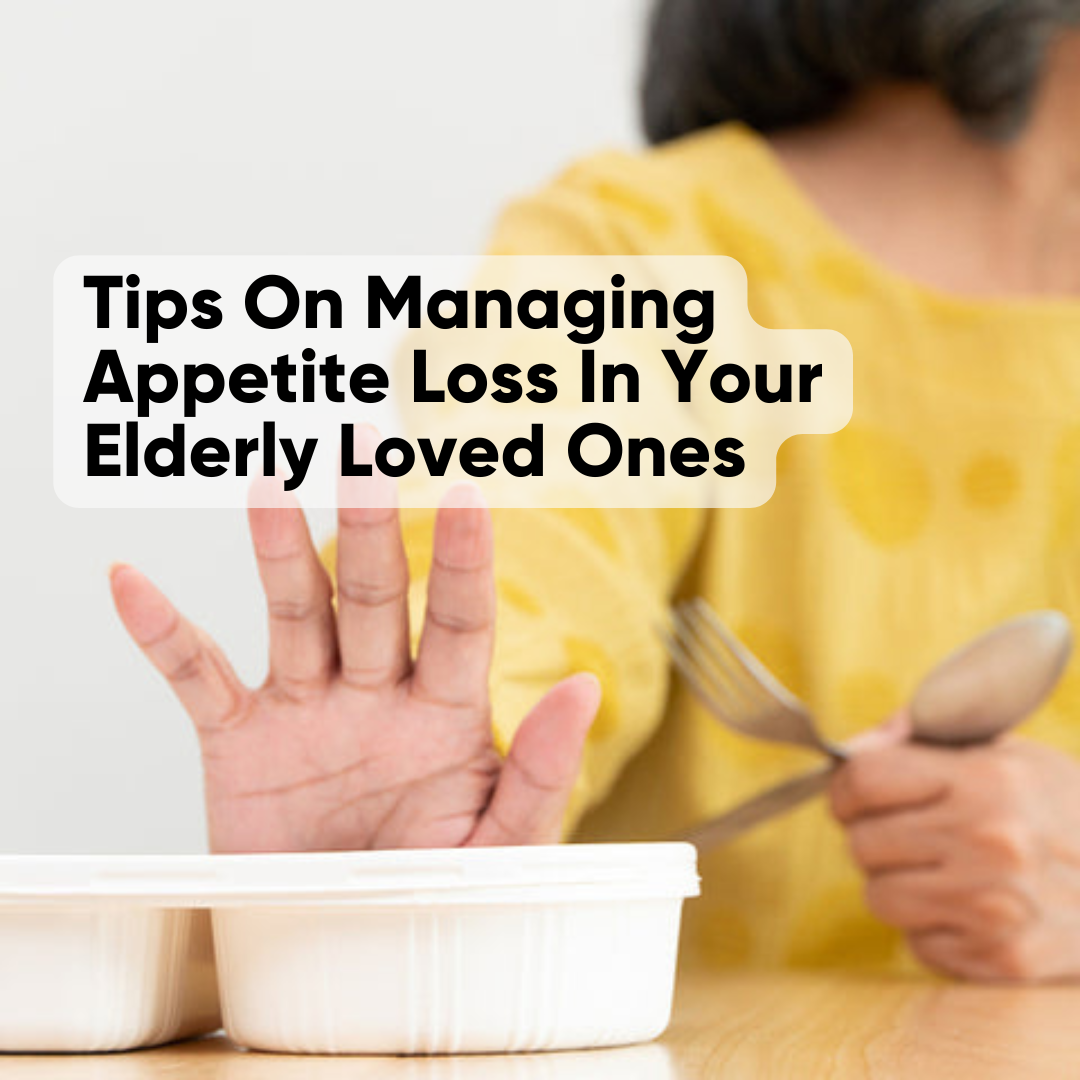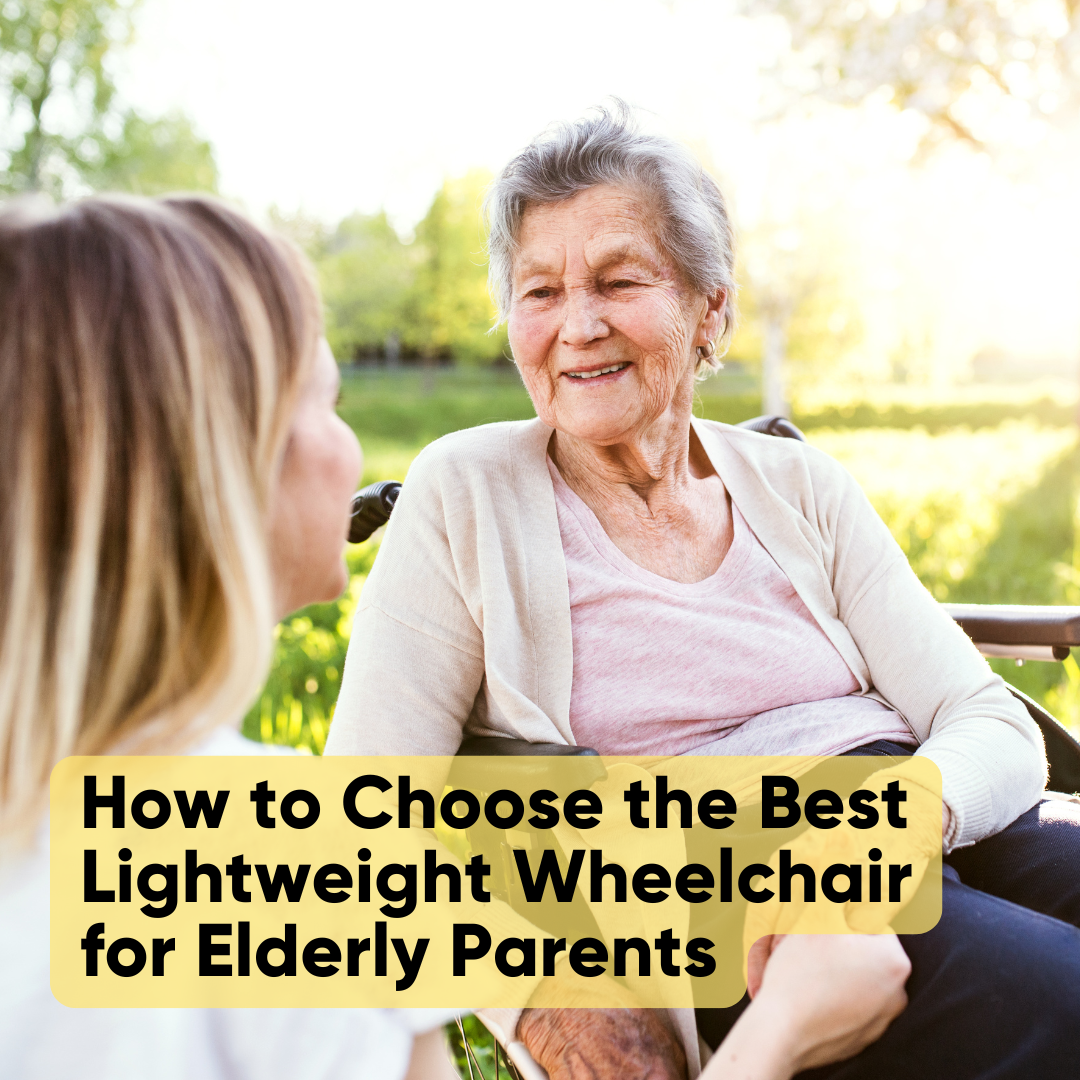Free SG local shipping for orders over $150. Express shipping options also available.
Menu
-
- Bestsellers
-
Mobility
-
Bathroom
-
Bedroom
-
Daily Living
-
About Us
-
- +65-8657-1657
- Contact Us
- Testimonials
- Product Reviews
- FAQs
- Login

Free SG local shipping for orders over $150. Express shipping options also available.
Add description, images, menus and links to your mega menu
A column with no settings can be used as a spacer
Link to your collections, sales and even external links
Add up to five columns
Add description, images, menus and links to your mega menu
A column with no settings can be used as a spacer
Link to your collections, sales and even external links
Add up to five columns
Tips On Managing Appetite Loss In Your Elderly Loved Ones
September 24, 2024 4 min read

If you are caring for your elderly loved ones and notice that they are recently leaving their meals untouched or seem disinterested in eating, they may be experiencing a loss of appetite. As we grow older, the body’s resting metabolic rate tends to decline, resulting in smaller appetites, as well as overall reduce mobility, such as requiring the support of a walking frame to prevent falls.
That said, signs like restrictive eating or sudden weight loss are a cause for concern for several reasons. For starters, this may interfere with the body’s healing capabilities, and seniors who shed at least 10% of their body weight are generally at risk of higher mortality rates. The question now is what can you do to turn things around?
Read on to discover the common causes that may be preventing your elderly loved one from eating and to learn tips to address the issue.
When Should You Be Concerned About Loss of Appetite?
Unlike mobility issues which are apparent and directly point to the need for assistive devices like a lightweight foldable wheelchair in Singapore, for instance, determining whether decreased appetite is a problem is not always clear cut. Eating less is typically considered par for the course due to the physical changes caused by ageing as well as a result of naturally fluctuating hormone levels in the body.
Other factors like medications and dentures might also affect the way older adults manage their diet. However, should these changes happen too quickly or their weight itself drops in just a short period of time, it may point to more serious health conditions such as:
- Throat or mouth infection, causing swallowing difficulties
- Gum disease
- Dry mouth
- Changes to the salivary glands
- Thyroid disorders
- Chronic obstructive pulmonary disease
- Alzheimer’s disease
- Multiple sclerosis, and more
If your loved one is in perfectly good health, there may be other factors contributing to their sudden dietary habit changes, such as:
- Chewing difficulties caused by dentures or other dental issues
- Dislike of their food’s smell or taste
- Insufficient exercise
- Dehydration
- Gastrointestinal changes that make eating and digesting uncomfortable
- Needing assistance during mealtimes following a stroke
- No longer being able to cook their food independently
How You Can Encourage an Older Family Member to Eat
Before trying to get your loved one to eat well again, it is important to first get them checked by their doctor to rule out any medication side effects or health conditions that may be causing their poor appetite. Only they can diagnose whether the underlying reason is medically related and suggest the proper course of action. Ideally, you’d want to document your loved one’s eating habits and weight measurements before and after the change in appetite as these records could be useful to the doctor.
After that, you can then try the following approaches to encourage your loved one to eat better:
1. Modify their menu
Following a balanced diet is essential as one gets older, but in cases when an elderly family member is no longer eating well, it is best to serve them more of their favourite dishes for a while. In case they are dealing with dental issues or swallowing difficulties, consider modifying the texture of these foods to make eating much easier.
Moreover, it may be best to incorporate appetite-stimulating ingredients like ginger, mint, and cinnamon where possible to further restore their interest in eating. Lastly, dividing three large meals per day into smaller and more frequent ones might be something that your loved one finds more manageable. If they find the idea agreeable, make sure to provide a variety of nutrient-rich foods to ensure they get the most out of every bite.
2. Share a meal together
Something as simple as eating together with senior family members can do wonders to boost their appetite. Whether it staves off the feelings of loneliness or tempts them to join in on the activity, dining as a group can get them to start eating without even realising it. This time also provides an excellent opportunity to engage in conversation and better learn why they have suddenly come to dislike eating.
3. Maintain a daily routine
Following a regular dining schedule and incorporating meal planning helps in regulating appetite, hence the importance of maintaining consistency in mealtimes. Doing so provides your loved one with a sense of predictability that can make their experience more comfortable. This is especially helpful for those diagnosed with progressive cognitive conditions.
4. Create a positive, supportive atmosphere
Beyond health issues, factors such as loneliness, anxiety, and depression are other key contributors to appetite loss in the elderly. Providing companionship is a tried and true way of mitigating the effects of these issues, as well as engaging in fun activities together and getting professional mental health support when necessary. Where they eat may also affect their appetite, so make sure the dining area is comfy, distraction-free, and well-illuminated to make mealtime more appealing.
Conclusion
Managing a decline or loss in appetite among elderly loved ones can inherently be a challenging process that takes time to resolve. As such, should your family member experience the same situation, be patient and empathetic and, most importantly, flexible in dealing with this issue by adapting to their changing needs.
For those looking for elderly assistive equipment to stay mobile and independent, The Golden Concepts curates a wide range to help you enjoy your golden years. Get in touch with us today or check out our website to browse our entire product catalogue of quality mobility aids and home care products designed to help the elderly age well.
Leave a comment
Comments will be approved before showing up.
Also in Caregiving

How to Choose the Best Lightweight Wheelchair for Elderly Parents
April 29, 2025 3 min read
Choosing the right wheelchair for an elderly parent can feel overwhelming, especially with so many options available today. A lightweight wheelchair offers greater mobility, ease of transport, and independence - key factors in enhancing your loved one’s quality of life.

